Resurrecting Aromanian Culture
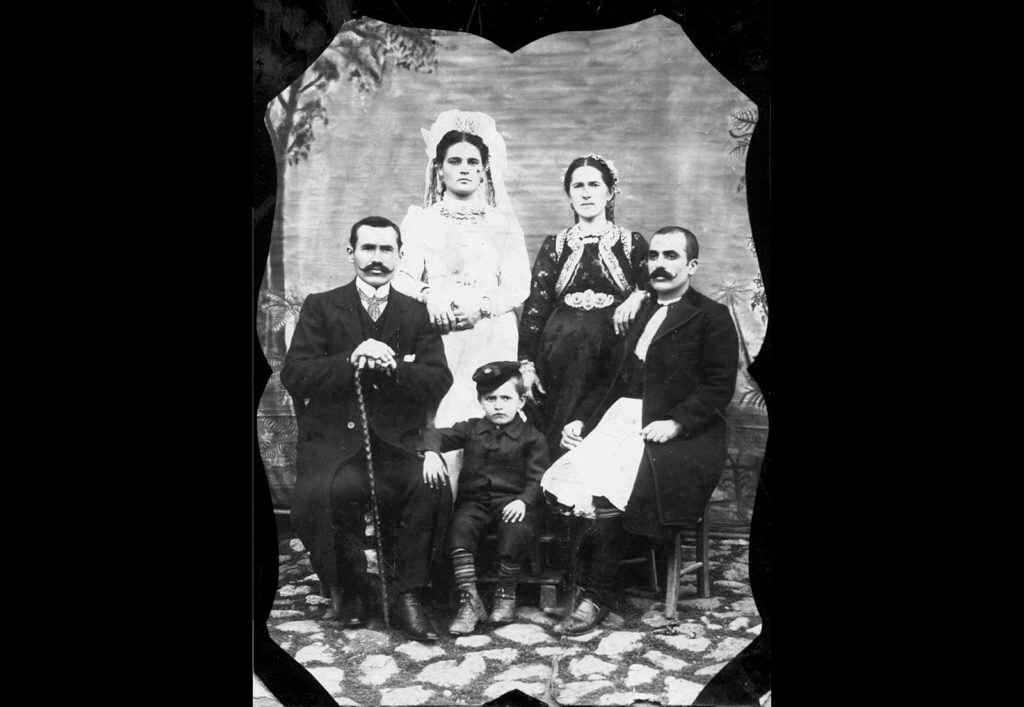
Whom are we kidding when we speak of preserving Aromanian culture for posterity?
There are two ways to preserve a culture for the future: alive, in schools, factories, mass media, government, trade, science, literature, and art; and dead, in a history book or a hermetically-sealed museum display of old colorful costumes.
When was the last time you watched an Aromanian television show? saw Aromanians protesting against nuclear war? Bought something from an Aromanian store? wore Aromanian clothing to go out to your favorite Aromanian restaurant and then to see a stunning play written by an Aromanian playwright, or went to a museum and saw a world-class abstract expressionist piece by an Aromanian painter which drew from or successfully translated his or her own culture, or went to Carnegie Hall (or tuned in to MTV) to hear Aromanian or Aromanian-influenced music, or completed a crossword puzzle based on clues from everyday Aromanian life?
I can answer most of these questions in a word: Never. Our culture long ago gave up most of its creativity, and in the 1980s it stands almost completely extinguished. In this essay I’d like to look at both the results of our cultural exhaustion and whether anything can be done about it. This is not a scholarly approach but a personal one, based on my own experiences.
For most of my life, I have wanted very little to do with my ethnic community. I kept in touch only with my own family. It seems safe to assume that most of the other members of my generation have felt this way, too, simply because the majority of them pulled away from the community as soon as they reached maturity, and haven’t come back.
Of course this loss of newer generations happens with every ethnic group, but I suspect that somehow it has been worse for ours than for others. Why is this?
I came back only by a series of accidents: my father’s death led me to join the Society Farsarotul because I knew it had meant a lot to him, and then Bob Nicola loaned me some books about our people, which made me realize I was terribly uninformed about my own ethnic group, and made me want to learn more. I was surprised by what I read—first, that we are neither Greek nor Rumanian in origin, and second, that we are really—literally—truly on the verge of extinction.
Now when I get a flier in the mail that tells me that the striped bass is faced with extinction but that with a little effort on my part this might be avoided, I do something—I give a few dollars, write my congressman, and join a conservation group working to save the striped bass. Thus you can easily understand that when I realized—at the late age of 25 or so—that my own “species” was on its way out, there was no question in my mind that I ought to do something to prevent it. So I became more active in the Society Farsarotul and re-entered the community —something that more and more members of my generation are also doing.
But even now I have a nagging feeling that we’d rather not be involved, that we somehow don’t belong in this very traditional culture of ours, no matter how much we’d like to keep it from disappearing. And indeed there is a very good reason for this: It is because we don’t belong in this traditional culture of ours. What I mean is simply that we are in the modern world, yet no one has bothered to update our culture in order to reflect that and to make it suit the modern world. Apparently some people feel that either our culture remains exactly the way it has been for 2,000 years, or else it is not our culture anymore. Nonsense! Our culture, like any other traditional culture in this world, will survive modernity if it is changed in order for it to fit in with that world.
I’ll give you an example of the kind of backwards thinking that is keeping our youth away from our culture as if it were some kind of disease—the same thinking that threatens to keep our culture from making it into the 21st century: I heard of a cultural event planned by a small refugee group in New York and I went, taking along a cousin. A fellow wearing a beret, a horrid green suit, yellow socks, and sandals got up and began a teary recital of a poem he wrote about how wonderful it used to be up in the Pindus Mountains when men had complete authority over their families and went out every day and guarded the sheep and fought off ethnic enemies…
I tell you, I wanted to die, to crawl into a hole somewhere, and if anyone asked me what I was, I would point to the little man in the green suit and say, “Anything but THAT!” It wasn’t just the way he was dressed that bothered me, although that was bad enough. What was worse is that he was extolling the things that, once upon a time, a teary-eyed Adolph Hitler would ponder about his own beloved German nation—the “good old days” of autocratic patriarchy, of racial separatism, and of manual labor on the sacred land.
And this is supposed to appeal to us in 1988? Personally I would rather fight against such ideas than on behalf of their continued survival. I’d like to see equal rights for women someday, and contact, understanding, and tolerance between all ethnic groups.
Another example: Not long ago, I went to a function which was billed as a “scholarly discussion” about our people. Most of the people there were not scholars. Of those who were, most did not make a presentation in their own field. Of those who made presentations, most were in Rumanian, not in Aromanian or in English. A few ethnic slurs and threats of armed violence were made. When the time came for discussion, there were shouting matches instead of civilized dialogue; there was breast-beating instead of critical understanding of others’ views; there was finger-pointing instead of serious group-wide self-examination and reflection. It was a mess; it was chaos.
This is supposed to attract and excite our generation? In 1988? I think I would have enjoyed a 3-day weekend in Tehran more than this. I can’t tell you how embarrassed I was, nor how hopeless I felt about our future as an ethnic group. There were almost no other young people there besides me, and the two people I dragged along. The average age was high enough to necessitate help in negotiating the steps to people’s seats. Who had made the wiser choice that day—I or the hundreds of our youth who stayed home or went to the beach? I think maybe it was they.
So you can understand that—while I am motivated to do whatever I can to help our culture survive if at all possible—I often feel as if my generation does not quite belong in this very traditional culture. Either we are wrong—and this applies to Europe as well as to America—or the culture is wrong. The old guard says we are wrong; I say it’s the culture. No one can expect a culture perfectly suited to nomadic mountain life away from civilization from 100 B.C. to about 1820 A.D. to be suited also to urban, literate life in 1988, in the age of high technology and global economy. It has to be updated, it must undergo drastic modification and modernization, if it is to interest us at all.
I tell you, I like American culture, and the Western culture of which it is a part. I enjoy listening to almost every kind of music, from jazz to new wave, from the blues to rock-and-roll, from country to classical. I like our movies and television, documentaries and dramas, comedies and street performances. I love the American system of government and education, as well as our theater and museums, painting, sculpture, dance, and other arts. Further, I am fond of many aspects of African culture, Hispanic culture, Greek culture, and many, many others.
Why can’t I love my own culture in quite the same way? Because it’s somehow “deficient” in relation to the others? Absolutely not. Our culture was in roughly the same position as other traditional societies were in the 1800s. It just hasn’t been translated into a modern idiom. All the others (the ones that have survived, anyway) have changed to suit the modern world, which is very different from the traditional world. Far from changing our own culture, we have instead been trying to “preserve” it—with the result that very shortly we will have a culture that is locked forever in a jar of formaldehyde instead of one that is living and breathing fresh air.
We don’t have a modern culture, one capable of surviving long in the modern world. It has to be made: We need artists, businessmen, writers, politicians, actors, lawyers, performers, doctors, singers, administrators, sculptors, computer programmers, et al. These people can choose to create or transform our culture—or not. We’ve produced many of them, but so far they have overwhelmingly chosen to work within the framework of other cultures, which somehow seemed more promising to them (Greek, Yugoslavian, Rumanian, Albanian, and even Western European and American).
We never had a modern culture created by us, for us. Our first and only high cultural tradition occurred under the aegis of the Rumanians: For the first time, our language was deemed worthy of being written and used as a vehicle for literature and culture. Much was written—mainly poetry in the vernacular. History and science were perhaps considered too serious for our language, however, and were written in Rumanian.
But this lasted less than 100 years. It affected only a tiny fraction of our people. And anyway, it was largely a traditional culture being recorded and “preserved,” not a modern culture
being created and publicized. It has sustained only a very few generations of Rumanian-educated Vlachs,who themselves still lived largely in a traditional society and had traditional tastes.
As a result, this poetry consists overwhelmingly of sentimental odes to mountain life and to sheepherding, along with some heroic ballads about our famous outlaws. There is little in this that can resonate amongst a postwar generation that has grown up with television, the atomic bomb, the Cold War, advanced computer technology, men on the moon, and a cultural life that has moved even light-years beyond Modernism. There is not much here for us. It is almost a complete zero— and not because it was in any way inferior to other cultures, but only because we and our forefathers did not take the raw material of our folk-culture and transform it as other cultures did.
This is one key reason why postwar efforts to revive our ethnicity have largely failed. There is nothing there to interest and appeal to our youth, and our youth are our future.
Try this simple experiment: Pick up any of the diaspora periodicals published in the 1980s. Look at the photographs of the “Congresses”: You will see mostly heads of white hair—and even those are mostly male. Women, when included at all, are often there to greet people or to cook (unless they are highly educated). Young people—when present at all—often have the sort of lost look on their faces that many of us recall from when we were children and were prodded to be somewhere not quite willingly. Do they really know what is going on? One can’t help thinking that, if they did, they wouldn’t be wearing fustanelli as proof that their culture will survive into the future, but would also be wearing $500 suits or T-shirts and faded jeans, and taking elements of their traditional folk-culture and translating them into modern buildings, works of art, books, plays, businesses, political theories or styles, etc.
If you think that the point I am raising here is brand-new and revolutionary, read this: Constantine Ucuta, a native of Moscopole and an Orthodox protopope in Posen, then part of Prussia, was deeply distressed by the failure of his countrymen to cultivate their language and make it an instrument of “modern enlightenment.” Instead, he complained, they had relegated it to the family circle and in society they preferred to speak Greek or some other language. In Noua Pedagogie, a small book of texts in Macedo-Rumanian published in Vienna in 1797, he implored his readers to teach their children to honor their mother tongue and warned that negligence would result in the decay of their national life and eventual assimilation by the overwhelmingly foreign populations amongst whom they lived.
This excerpt is from Keith Hitchins’s book Orthodoxy and Nationality, published in Cambridge, Mass., in 1977. This book, by the way, is one of a very few in English which use the term “Macedo-Rumanian.”
What is true of the language is true of the culture in general: Who is out there creating the elements of a renewed, modern culture for us? Very, very few people—a mere handful. I can think of an architect in New York, George Zdru who designed a house inspired by our history and culture—an intelligent, inspiring work, and proof that it can be done. I can think also of two poets—one in Greece, Zoe Papazisi-Papatheodorou, and one in Germany, Kira Iorgoveanu—who have transcended the usual pastoral-mountain genre to achieve serious works which attempt to grapple with such complexities as love and human society.
Of our earlier generation of poets, now mostly deceased, George Murnu and George Perdichi stand out as having achieved a modern poetry. An actor in Rumania, Ioan Caramitru, is well-known there but the influence of his ethnicity is not as well-known. There is also one popular singer I know of in Greece, Sterio Dardaculi, who is creating new songs in Aromanian, and one, Taki Mousafiri, whose compositions draw on his Vlach heritage. Finally, I can think of a painter in America, Gus Moran, who has tapped his ethnic background for themes for his work.
While there are undoubtedly more than just these few, these are the only ones that I can think of, and there aren’t likely to be many more that I have missed. We have many other talented people, but they have chosen to perform their social activities wholly within the boundaries of other cultures—usually Greek, Rumanian, Yugoslavian, Albanian, and sometimes even Western European and American—instead of their own, much as Constantine Ucuta’s countrymen chose to speak socially in another language and thus not look after and cultivate their own.
That leads us back to our original question: Who are we kidding when we speak of preserving Aromanian culture for posterity? We are only kidding ourselves, because right now there is very little of an Aromanian culture which is capable of surviving into the future—at least one which holds any real appeal for people living in the late 20th century. It has to be created. But how can a whole generation which seems so unimpressed with its culture be expected to pick up this challenge, suddenly to see something worthwhile in the old culture and to regenerate it? I really have no idea, and I must admit it doesn’t seem too likely.
But it is certain that it is possible. Look at the recent phenomenon of the Bulgarian women’s vocal groups. Traditional Bulgarian musical forms were combined with Western classical styles and the result was so appealing that American music critics loved it, famous rock musicians and composers attended the New York concert, and local record stores can’t keep the album in stock. One of our own musical styles—vocal polyphony—is quite similar to that of the Bulgarians; why hasn’t anyone deemed it worthy of being updated for modernity?
The task is not such a hard one. It consists of having a body of professional people in all walks of life, which we do have; turning to out Balkan heartland for guidance, information, and inspiration; recognizing the influences that our culture has had upon our work; learning more about our culture and using it as a resource in our work; and then simply acknowledging the link between our work and our Aromanian culture.
A 20th-century writer might still incorporate motifs from stories we have been telling for millennia. Clothing designers might draw on the handsome cut of certain of our past clothing styles, or fabric designers on our weaving patterns. Food connoisseurs and chefs have a ready-made resource in our excellent cuisine. Political aspirants have our tradition of social action and compassion to draw on, while the humor and earthiness that are central to our culture and language act to clarify and smooth our endeavors in most any realm in which we involve ourselves.—And so on.
These are the facts: We are here. We are a handful of the last representatives of a dying culture. We have a few choices, including:
-
- Run away from it completely and uncritically (as most of us have done).
- Embrace it completely and uncritically (as our most fanatical nationalists have done).
- Try to figure out what aspects of it we ought to keep or might be worth preserving, and how to bring those things into the 21st century.
- Pretend that there is no problem.
- Figure out some other way to approach this.
At the very least, we ought not kid ourselves. Every one of us is now facing these choices, whether we like it or not, and every one of us has made or is making one of these choices. It is not a great moral question, and none of these choices is clearly “right” or “wrong.” Though none of us asked to be born into Aromanian culture, we were—and that is what imposes this choice upon us.
As far as I’m concerned, I can’t get too excited anymore about poems extolling patriarchal, ethnocentric mountain life. I maintain my membership in the Society Farsarotul, however, and try to help the culture along in whatever little way I can, while anxiously awaiting other signs of its regeneration so that I may support them, too.
But only if they appeal to me and inspire me—here and now, in the late 20th century.
Drawings by P. T. Daukas, Jr.
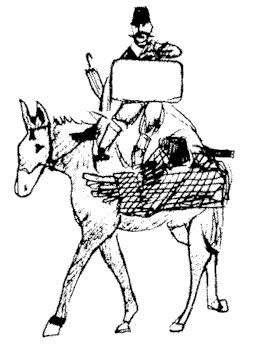
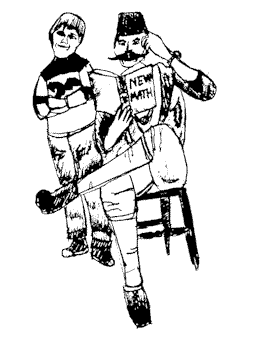
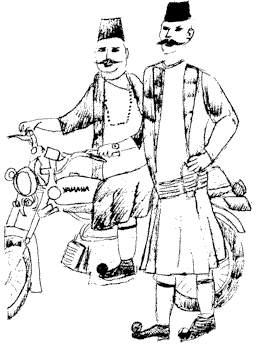
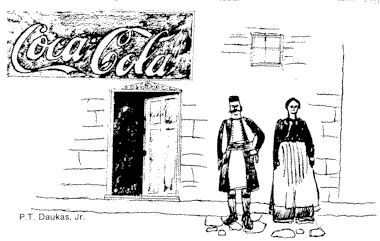


Responses